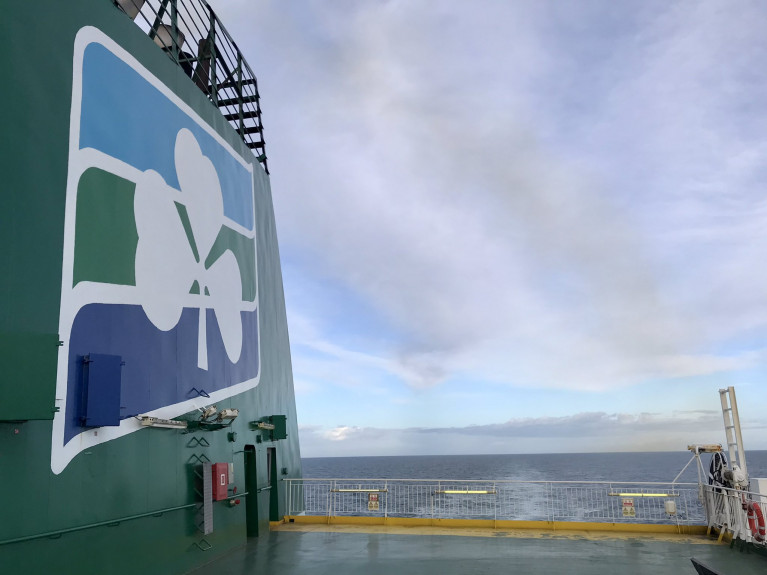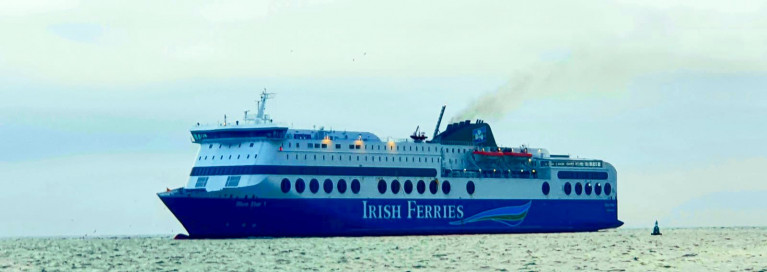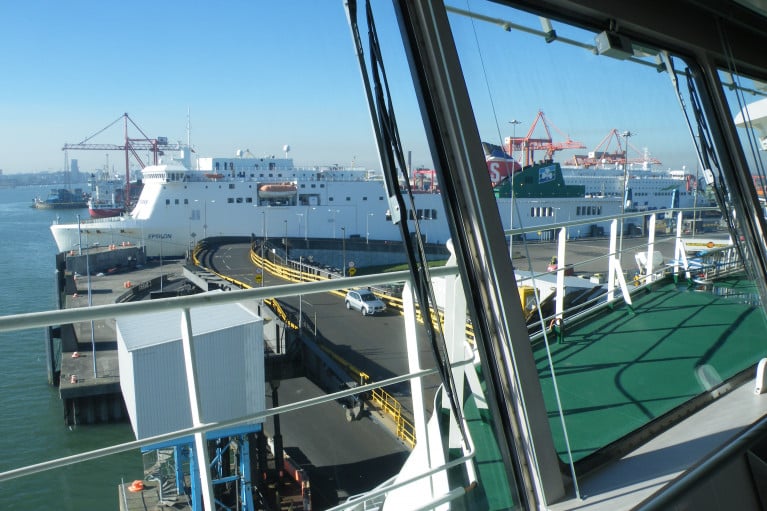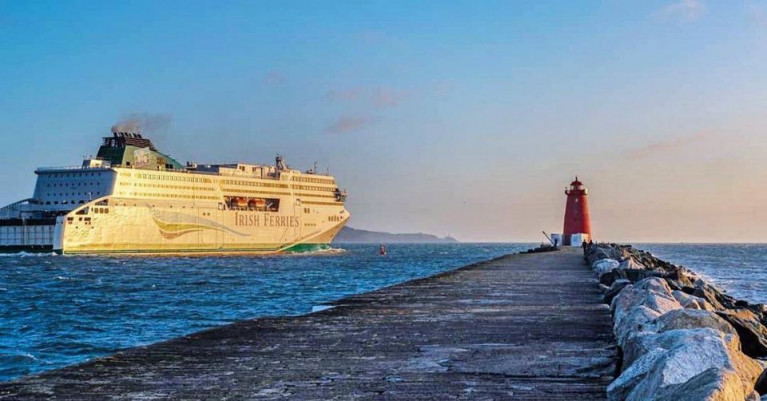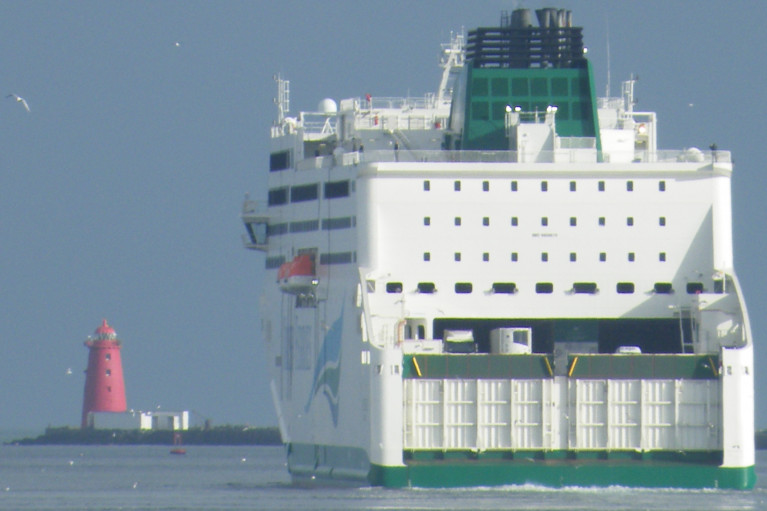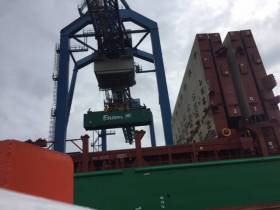Displaying items by tag: ICG
The Irish Continental Group (ICG) which is the parent company and owner of Irish Ferries has called for ‘green lanes’ for freight on UK-Ireland routes, for goods destined for Northern Ireland.
On Thursday, ICG used a trading update in regards to the post-Brexit Windsor Agreement (reached in February) which will see the majority of customs checks suspended for trade transported between Britain and Northern Ireland. ICG have called for this arrangement also to be replicated for freight when travelling from Britain, via Ireland and onwards to the North.
“If a trader can be trusted to enter Northern Ireland and not enter the Republic of Ireland, then it would appear logical that the trader can be equally trusted to enter via the Republic of Ireland and go directly to Northern Ireland,” commented ICG.
“This would allow Northern Ireland goods to travel via the shortest, most efficient, and environmentally friendly route.”
The Dublin based maritime transport group, added that they have written to the Irish government and the EU to ask them to consider the proposal.
The call by ICG follows as revenue and volumes in its container brand (EUCON) and terminal divisions, Dublin Ferry Terminals (DFT) and Belfast Container Terminal (BCT) remain down, while its ferries division saw a boost.
More from Independent.ie on the ferry division that Afloat also reported is to introduce Oscar Wilde onto the Ireland-UK (Wales) route of Pembroke-Rosslare from where they also operate directly to France on mainland Europe.
In addition, in 2021 they launched a UK-France service on the premier short-sea route of Dover-Calais .
Irish Ferries Owner ICG Sees Revenues Rise Almost 80% as Covid Curbs Dropped
Irish Ferries parent company Irish Continental Group (ICG), has reported a big jump in revenues as travel restrictions from Covid eased compared to the same time last year.
ICG said its group revenues in the trading period 10 months prior to the end of October soared to €500.5m, an increase of 78.9% compared with last year and a 62.1% increase on 2019.
In the ferry division which has four routes linking between Ireland, the UK and France, revenue came to €338m, an increase of 133.9% on the previous year and 83.4% rise on 2019.
According to the Dublin based group, the increases was mainly due to travel restrictions eased, coupled with an increased fuel surcharges. In addition the launch in June, 2021 on the UK-France route of Dover-Calais service operated by a trio of ferries competing with DFDS and P&O Ferries.
The ferry operator reported in the year up to 19 November that it carried a total of 525,600 cars which was an increase of 198% compared to the previous year.
For more RTE News reports figures for freight during the same trading period.
Revenue Increases Sharply At Ferry Group ICG
Irish Ferries parent company the Irish Continental Group has reported an increase in revenue for the first four months of the year.
In a trading statement, the group provides comparisons to the same period last year as well as to the first four months of 2019, the year before the pandemic struck.
ICG said group revenue up to the end of April this year came in at €161.2 million - an increase of 80.5% on last year, but it was also up over 57% on 2019 levels.
Net debt increased by €30 million to stand at just over €174 million.
The increase in debt was accounted for by strategic capital expenditure mainly arising from the acquisition of two ferries for their new Dover-Calais service as Afloat reported, the Ciudad de Mahón from a Spanish operator and Calais Seaways from a Danish company.
RTE News has more from both the ferry and container/terminal divisions.
To consult ICG's Trading Statement, click here.
Higher revenues for the six months to the end of June have been reported by the Irish Continental Group, but a drop in earnings before interest and tax as the Covid-19 pandemic continued to create an "exceptionally challenging" trading environment for the company.
ICG which owns Irish Ferries, said its revenues rose by 8.3% to €141.6m, while EBIT generated was a loss of €10.3m, €0.8m worse than the same time last year.
The company reported a loss before tax of €12.2m compared to a loss before tax of €11.2m last year.
ICG said that travel restrictions in place in the first half of the year materially reduced its passenger business.
But it added that it has maintained services on all of its shipping routes, keeping critical logistical links to the island of Ireland.
RTE News has more to report here.
Ferry Owner Irish Continental Group Sees Revenues Down 26% on Covid Hit
Ferry company owner Irish Continental Group has reported a 26% drop in revenues for the first 10 months of 2020 as the number of cars it carried on its ferries slumped by 66.8%.
In a trading update, ICG which operate Irish Ferries (services to the UK and France), said its revenues for the ten months to the end of October fell to €229m, a decrease of €79m on the same time last year.
ICG said its ferries division faced challenging trading conditions after the continuation of travel restrictions across the EU which were first introduced in the middle of March due to the Covid-19 pandemic.
It said that car volumes were down 66.8% to 122,700 from 369,700 the same time last year, with total passenger volumes down 68% compared with 2019.
ICG said this has had a material impact on passenger revenues, which were 71% lower in the year to October 31 compared to 2019.
But it added that its Irish Ferries ro-ro freight carryings have been more robust with retention of full freight schedules providing critical logistical links to the island of Ireland, with ro-ro freight carryings up 4% compared with 2019.
Further coverage from RTE News in addition a link to consult ICG's trading statement in full.
Irish Ferries parent company Irish Continental Group has reported a drop in revenues and earnings for the first six months of the year amid a challenging background of depressed economic activity and travel restrictions imposed across the EU because of the Covid-19 pandemic.
ICG said this had led to a significant reduction in passenger traffic, however freight activity across the group has been less affected.
Revenues for the six months to the end of June decreased by 21.6% to €130.8m from €166.8m the same time last year, while EBITDA sank by 66.7% to €10m from €30m.
ICG, which owns Irish Ferries, posted a loss before tax of €11.2m compared with a profit before tax of €24.9m the same time last year.
The company said the trading conditions faced by the group since March, particularly in its passenger business, have been the most challenging encountered in its 32 year history.
More here RTE News reports on this story.
Ferry and container operator Irish Continental Group (ICG) reported revenues fell more than 21 per cent in the first six months of the year as the coronavirus pandemic caused economies to shut down.
But the group, reports Irish Times, said it remained in a strong financial position to weather the Covid-19 storm.
The ferry company (Irish Ferries) said consolidated revenue for the six months to June 30th 2020 fell 21.6 per cent to €130.8 million, dragged lower by a 65 per cent decline in passenger volumes over the period. Net debt at the end of the period was €103.3 million, down from €129.0 million at the end of December 2019.
The ferries division showed a decline of more than 33 per cent, with revenue at €61.6 million for the year. Passenger cars were down 65 per cent to 56,600, compared with 161,200 a year earlier.
The container and terminal division saw a 6.6 per cent fall in revenues for the six months, as supply chains were disruption by Covid-19. Over the year to July 25th, container freight volumes were 10.5 per cent lower at 178,300 20-foot equivalent units, with units handled at the Dublin Port and Belfast Harbour (see: terminals) down 13.6 per cent year on year to 160,100 lifts.
For further reading click here.
In addition Afloat adds to consult ICG's Trading Update (here) that was released today.
Containership Fleet in Irish Continental Group (ICG) Rises to Six
Dublin based Irish Continental Group (ICG) has brought its sixth containership.
The shipowner and ferry operator, reports Tradewinds, has acquired the 974teu CT Rotterdam (built 2009), for an undisclosed price.
Afloat adds that the container vessel was preceeded by another acquisition in April as outlined further below.
On Wednesday the Group released a trading update which saw increased revenue in its passenger /freight division, Irish Ferries.
According to the trading update, in April an acquisition took place of the Thetis D. Afloat can reveal the lo-lo vessel has a capacity for 1421teu. The containership was built in 2009 likewise of the aforementioned CT Rotterdam which was acquired this month.
The group's Container & Terminal Division includes lo-lo shipping activities under the Eucon brand and the operation of two container terminals, Dublin Ferryport Terminals (DFT) and Belfast Container Terminal (BCT).
The trading update for this division, revealed a total revenue volume of €131.0 million in the period to 31 October, this was a 9.1% increase on the previous year. For more on the performance of this sector as part of the Group's overall trading update can be read by clicking here.
Increased Revenue at Irish Ferries Following Disruptions in 2018
Irish Continental Group, the parent company of Irish Ferries has reported revenue of €308.8m in the first ten months of 2019, an increase of 8.2pc on the same period last year.
As the Independent.ie writes, ICG said a "significant" proportion of the improvement came from the ferries division, on the back of improved scheduling reliability following major disruptions in 2018.
Despite this, it experienced "some volatility in carryings as key Brexit dates were approached and subsequently postponed".
The overall effect of this continuing uncertainty "is generating negative impact on consumer sentiment and trade flows as investment decisions are delayed".
For further reading click here.
Improved Revenue Growth at Irish Continental Group
Maritime transport operator, Irish Continental Group has reported revenue 6% higher for the half year, following the introduction of the WB Yeats cruise ferry on schedule services with Irish Ferries in January.
Earnings per share, reports RTE News, however, were down 16% to 12.8 cent. ICG reported its interim dividend increased by 5% to 4.42 cent.
The company is concerned about the impact of Brexit but says it can pursue other opportunities, and remains confident for continued revenue growth.
ICG sold the Oscar Wilde ferry in April for €28.9 million, following the sale, a year earlier, of the Jonathan Swift for €15.5 million.
Fuel costs increased by €3.1 million to €25.5 million in the six month period.
Click here for more on this story.



























